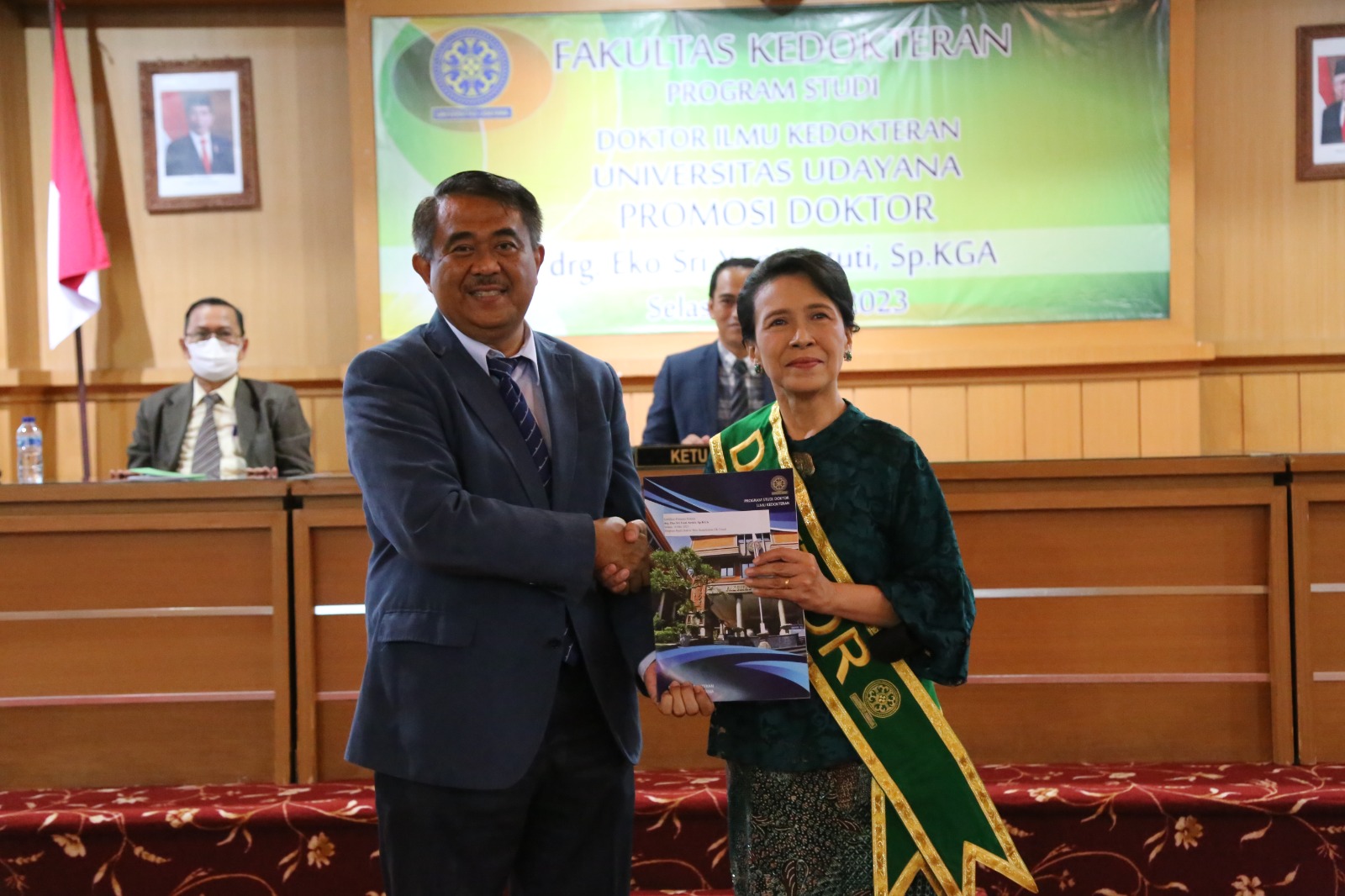New Doctor Assesses the Potential of Barracuda Fish Scales in Addressing Dental Caries Problems in Children
New Doctor Assesses the Potential of Barracuda Fish Scales in Addressing Dental Caries Problems in Children
Located in the graduate courtroom lt. III, Denpasar Postgraduate Building, the Doctoral Promotion exam has taken place with promovenda candidate drg. Eko Sri Yuni Astuti, Sp.KGA., with the dissertation title "The Effect of Barracuda Fish Scale Nano Paste (Sphyraena Barracuda) on Email Remineralization, Transforming Growth Factor β1, Bone Morphogenetic Protein-2, Alkaline Phosphatase in Rattus Norvegicus Wistar Strains with Early Childhood caries."
(16/5/2023)
Early childhood caries (ECC) is caries affecting primary teeth in children under 71 months of age. The prevalence of caries in Indonesia in children aged 5 years is 51.2%. Calcium and phosphate ions are required for the remineralization of tooth enamel, calcium ions can also modulate pulp cells to secrete several growth factors, including TGFβ1, BMP2 and ALP which play a role in the formation of tertiary dentin through a series of molecular and cellular events. Barracuda fish scales (Sphyraena barracuda) containing 11.25% calcium (Ca) and 7.09% phosphate were made into nano-sized powder and made into a paste. The aim of this study was to prove that barracuda fish scale nano paste can increase enamel remineralization and stimulate tertiary dentine formation in caries rats by studying the markers TGFβ1, BMP2 and ALP.
This study used a pure experimental method (true experimental) with a randomized posttest only control group design, and involved 32 Rattus Norvegicus Strain Wistar rats aged 1.5-2 months for dentine caries, divided into 16 rats for the treatment group with topical application. barracuda fish scale nano paste twice a day for 30 days and 16 rats were not given any treatment as the control group. The research was conducted at the Integrated Biomedical Laboratory of the Faculty of Medicine, Udayana University for 3 months and the Udayana University Faculty of Medicine and LPPT UGM. Email remineralization was measured by email microscraping using the Micro Vickers Hardness Tester brand Shimadzu Japan, and levels of TGFβ1, BMP2 and ALP were examined by ELISA (enzyme linked immunosorbent assay). Differences in enamel hardness and marker levels of the two groups were tested by independent t-test.
The exam was led by the Deputy Dean for Student Affairs and Information, FK Unud, Prof. dr. I Md. Ady Wirawan, MPH., Ph.D. with the testing team:
1. Dr. dr. I Ketut Suyasa, Sp.B.,Sp.OT(K) (Promoter)
2. Prof. Dr. dr. I Made Jawi, M.Kes (Co-promoter I)
3. drh. I Nyoman Mantik Astawa, Ph.D (Co-promoter II)
4. Dr. dr. I Made Bakta, Sp.PD-KHOM
5. Prof. Dr. Ir. Ida Bagus Putra Manuaba, M. Phil
6. Dr. dr. I Wayan Putu Sutirta Yasa, M.Si
7. Dr. dr. A.A Ngurah Subawa, M.Sc
8.Dr. dr. Ida Ayu Ika Wahyuniari, S.Ked., M.Kes
9.Dr. err. nat. dr. Ni Nyoman Ayu Dewi, M.Sc
10.Dr. dr. I Nyoman Wande, S.Ked.,Sp.PK(K)
While academic invitations are:
1.Dr. drg. Dewa Made Wedagama, Sp.KG., FICD
2.Dr. drg. Haris Nasutianto, M.Kes, Sp.RKG (K)
3.Dr. dr. Luh Nyoman Alit Aryani, Sp.KJ., Subsp.Ad(K)
4.Dr. dr. Made Agus Hendrayana, M.Ked
5.Dr. drg. Putu Lestari Sudirman, M. Biomed
In this exam, Dr. drg. Eko Sri Yuni Astuti, Sp.KGA., was declared to have passed as the 379th Graduate Doctor of the Doctoral Degree in Medical Sciences, Faculty of Medicine, Udayana University with a very satisfactory predicate.









